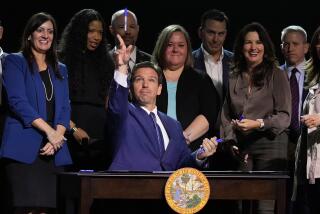Communist Sympathy Leads Group to Help Elian, Critics Say
- Share via
WASHINGTON — The National Council of Churches, which has plunged into the middle of the Elian Gonzalez case, is a controversial organization that often has espoused liberal causes. Critics accuse it of having been too cozy with Marxist governments abroad.
The 50-year-old council, which includes 35 Protestant and Orthodox denominations with 52 million members, is a longtime supporter of the civil rights movement in the United States and has helped rebuild burned-out churches in black communities of the South over the last two years. Its president is Andrew Young, the former United Nations ambassador and associate of the late Martin Luther King Jr.
But critics say that the council often has been too friendly toward the Communist governments of Cuba and North Korea and say that it has failed to speak out against human rights abuses in those nations, a charge that the organization disputes. It cites its decades of work to alleviate poverty abroad and resettle refugees here.
Detractors say it is no surprise that the council is on the same side as Fidel Castro in the Gonzalez case. Castro is supporting the efforts of the 6-year-old’s Cuban family--his father and grandparents--to have Elian returned to his homeland.
Roy Lloyd, a council official, said of its longtime involvement with churches in Cuba: “We were there before Castro and we’ll be there after Castro.”
The journey of Elian’s grandmothers to the United States on an aircraft chartered by the council originated with a Dec. 9 phone call from the head of Cuba’s church council, Lloyd said.
The Gonzalez case fit squarely with the U.S. council’s mission to work for family unification and promote understanding among religious people worldwide, officials said. A council brochure says that the organization “works for peace and justice in the United States, addressing issues ranging from poverty and racism to the environment, family ministries, disability and much more.”
Overseas, the council has undertaken “cooperative efforts with U.S. denominations and their congregations that have resettled some 400,000 refugees in this country,” according to its literature.
“Any group that works for social justice gets accused of being Communist,” observed Carol Fouke, a council executive. “Certainly a lot of nuns and priests have been tarred with that brush, as well as civil rights leaders.
“We maintain relations with church councils all over the world.” In some cases, she said, the U.S. government and the government of another country have good relations. In other cases, the “governments are hostile” or “unconcerned.”
In the case of Elian, the council’s new general secretary, Robert W. Edgar, a former Democratic member of Congress from Pennsylvania, flew to Havana with others early this month to help clear the way for the grandmothers’ visit. Edgar and his party met with the child’s father as well as Castro, who personally expressed satisfaction that the two church councils were working to resolve the situation, officials said.
Edgar, a United Methodist minister, is president of the School of Theology at Claremont, Calif.
Some of the council’s detractors, including Mark Tooley, a director of the Washington-based conservative Institute on Religion and Democracy, charged that the council began losing members and became “radicalized in embracing the Marxist-influenced liberation theology of Latin America in the 1970s.” Its “left-wing politics,” he said, have left the organization millions of dollars in debt, a financial situation acknowledged by council officers.
More to Read
Sign up for Essential California
The most important California stories and recommendations in your inbox every morning.
You may occasionally receive promotional content from the Los Angeles Times.













